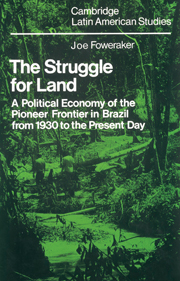 The Struggle for Land
The Struggle for Land Book contents
- Frontmatter
- Contents
- List of maps
- Preface
- Glossary of acronyms and abbreviations used in the text
- Glossary of words and phrases in Portuguese used in the text
- 1 Brazil: political and administrative divisions
- 2 Principal frontier regions
- 3 West Paraná: estates and municipalities
- 4 South Pará
- 5 South Mato Grosso
- Part 1 The pioneer frontier
- 1 The pioneer frontier; political violence and the peasantry
- 2 The process and stages of occupation of land on the frontier
- 3 Frontier expansion and the national economy
- Part 2 Political mediation
- Part 3 Accumulation and authoritarianism
- Bibliography
- Index
- CAMBRIDGE LATIN AMERICAN STUDIES
1 - The pioneer frontier; political violence and the peasantry
Published online by Cambridge University Press: 29 October 2009
- Frontmatter
- Contents
- List of maps
- Preface
- Glossary of acronyms and abbreviations used in the text
- Glossary of words and phrases in Portuguese used in the text
- 1 Brazil: political and administrative divisions
- 2 Principal frontier regions
- 3 West Paraná: estates and municipalities
- 4 South Pará
- 5 South Mato Grosso
- Part 1 The pioneer frontier
- 1 The pioneer frontier; political violence and the peasantry
- 2 The process and stages of occupation of land on the frontier
- 3 Frontier expansion and the national economy
- Part 2 Political mediation
- Part 3 Accumulation and authoritarianism
- Bibliography
- Index
- CAMBRIDGE LATIN AMERICAN STUDIES
Summary
The pioneer frontier: specificity and generality
The aim of this book is to reach an understanding of the pioneer frontier in Brazil. The object of study is conceived as the particular process of frontier expansion occurring in the country over the last half century. This concept of frontier in no way corresponds to the so-called cyclical character of economic growth and occupation of land in Brazil. There is, therefore, no intention here of following precedent (Normano 1935; Castro 1969) and presenting the entire economic history of the country in terms of its ‘frontier’ experiences. These growth cycles have been observed to follow the economic booms in different products for export to the world market – such as sugar, gold, coffee and rubber – and have depended on new demands arising within that expanding market over the centuries (Prado 1962a; Furtado 1963). The pioneer frontier, on the contrary, has expanded in response to the demands of the national market and in function of economic accumulation within the national economy since 1930.
It is to be expected that as the concept of frontier gains currency it will lose content. There is already an account which assimilates most of Latin American history to the idea of ‘frontier’ (Hennessey 1978). So it must be clear at the outset that the pioneer frontier is a process of occupation of new lands which is historically specific.
- Type
- Chapter
- Information
- The Struggle for LandA Political Economy of the Pioneer Frontier in Brazil from 1930 to the Present Day, pp. 3 - 26Publisher: Cambridge University PressPrint publication year: 1981
- 1
- Cited by


